By Christopher Rollyson ![Herd the Cats [Social Business Team Building] Case4](http://rollyson.net/wp-content/uploads/2013/04/sbtb4.png) [UPDATED] Herd the Cats is usually initiated by the CMO/CDO (Chief Digital Officer) or other enterprise practice or brand executive who discovers that various business units or brands in the organization have diverse social media presences without much apparent direction or business results. S/He wants to use strategy to provide a keel that resonates with corporate strategy, addressing issues as diverse as corporate citizenship, community, health or policy. [UPDATED] Herd the Cats is usually initiated by the CMO/CDO (Chief Digital Officer) or other enterprise practice or brand executive who discovers that various business units or brands in the organization have diverse social media presences without much apparent direction or business results. S/He wants to use strategy to provide a keel that resonates with corporate strategy, addressing issues as diverse as corporate citizenship, community, health or policy.
In 2013, digital marketing and firm executives are thinking about building their internal teams to provide more continuity and scale, so the champion often wants to create a social business “center of excellence” to serve several businesses or brands, leveraging enterprise resources to improve social business performance and contributions.
Herd the cats is the fourth of the five-part social business team building series The series describes team building in the context of various scenarios in which firms build social business capability, step by step, while investing wisely. Social Business Strategy Use Cases outlines and compares all five use cases while Social Business Team Building gives general guidance for how to create social business teams as well as recommendations for what characteristics leaders have, so I recommend reading them, too.
Continue reading Herd the Cats [Social Business Team Building]
By Christopher Rollyson  Anonymity, Marketing and Predicting the Future shows that, although each culture has its own concepts of “anonymity” and “marketing,” anonymity will prove to have been a temporary phenomenon in most human cultures because communications technologies are counteracting it. Moreover, based on my studies of and experience with sociology, evolutionary psychology and technology, I observe that 20th century marketing is grounded in anonymity, so we can predict the future of marketing by exploring anonymity and its relationship to marketing. Anonymity, Marketing and Predicting the Future shows that, although each culture has its own concepts of “anonymity” and “marketing,” anonymity will prove to have been a temporary phenomenon in most human cultures because communications technologies are counteracting it. Moreover, based on my studies of and experience with sociology, evolutionary psychology and technology, I observe that 20th century marketing is grounded in anonymity, so we can predict the future of marketing by exploring anonymity and its relationship to marketing.
In brief, marketing’s influence is most poignant when anonymity is high and the marketing “target” is ignorant of the product/service and how to use it. In this scenario, the target is most open marketing’s influence. Read on to learn how marketing is related to anonymity, where anonymity is going and how marketing can transform to strengthen its influence.
Marketing organizations that do not transform will be sidelined because anonymity is dissipating fast. Continue reading Anonymity, Marketing and Predicting the Future
By Christopher Rollyson ![Catch Social Media Leaders [Social Business Team Building] case3](http://rollyson.net/wp-content/uploads/2013/04/sbtb3.png) [UPDATED] Catch Social Media Leaders applies to organizations with very conservative cultures—banks, insurers, healthcare, governments, B2B firms, and professional services to name a few—that have sat on the sidelines and now feel nervous because they are so far behind. In 2013, digital marketing and firm executives are thinking about building their internal teams to provide more continuity and scale, so here I’ll show how firms can use strategy and best practices to outperform rivals across the social business life cycle. [UPDATED] Catch Social Media Leaders applies to organizations with very conservative cultures—banks, insurers, healthcare, governments, B2B firms, and professional services to name a few—that have sat on the sidelines and now feel nervous because they are so far behind. In 2013, digital marketing and firm executives are thinking about building their internal teams to provide more continuity and scale, so here I’ll show how firms can use strategy and best practices to outperform rivals across the social business life cycle.
Catch Social Media Leaders is the third of the five-part social business team building series The series describes team building in the context of various scenarios in which firms build social business capability, step by step, while investing wisely. Social Business Strategy Use Cases outlines and compares all five use cases while Social Business Team Building gives general guidance for how to create social business teams as well as recommendations for what characteristics leaders have, so I recommend reading them, too.
Continue reading Catch Social Media Leaders [Social Business Team Building]
By Christopher Rollyson ![Fire Drill [Social Business Team Building] Case2](http://rollyson.net/wp-content/uploads/2013/04/sbtb2.png) [Updated] The (social business) fire drill is sparked by an external or internal event that suddenly creates a sense of urgency and elevates management’s interest in social business/social media. They often respond in crisis mode and end up wasting considerable resources because they spend more than they need, they stay away from using social technologies to relate to stakeholders (they’ve been burned), and they hire a team that cannot produce maximum social business results because it is reactive and fearful rather than proactive and confident. [Updated] The (social business) fire drill is sparked by an external or internal event that suddenly creates a sense of urgency and elevates management’s interest in social business/social media. They often respond in crisis mode and end up wasting considerable resources because they spend more than they need, they stay away from using social technologies to relate to stakeholders (they’ve been burned), and they hire a team that cannot produce maximum social business results because it is reactive and fearful rather than proactive and confident.
Fix Fire Drill is the second of the five-part social business team building series The series describes team building in the context of various scenarios in which firms build social business capability, step by step, while investing wisely. Social Business Strategy Use Cases outlines and compares all five use cases while Social Business Team Building gives general guidance for how to create social business teams as well as recommendations for what characteristics leaders have, so I recommend reading them, too.
Continue reading Fire Drill [Social Business Team Building]
By Christopher Rollyson 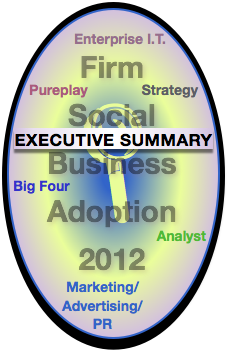 Advisory & Services Firm Social Business Adoption 2012 is a research survey that looks at social business advisory/consulting firms in a new way. Using quantitative methods, I compared consultancies according to the needs of clients who want to transform their organizations with social business. The twelve metrics measure firms’ performance in business impact, sociality, and transformation areas, and they rank firms within firm categories and overall. Advisory & Services Firm Social Business Adoption 2012 is a research survey that looks at social business advisory/consulting firms in a new way. Using quantitative methods, I compared consultancies according to the needs of clients who want to transform their organizations with social business. The twelve metrics measure firms’ performance in business impact, sociality, and transformation areas, and they rank firms within firm categories and overall.
Now prospective clients can compare Strategy firms, Big Four firms, Agencies, Analysts, Enterprise IT firms, and Pureplays quantitatively. Moreover, consulting firms can use these metrics for guidance in building out their social business practices.
I launched CSRA in 2006, and we have always practiced social business as transformation. Client work in social business transformation enables me to see where the market is going, so this survey considers social business firms from that future state.
[UPDATE 8 Mar] Now available: “Executive Briefing” is even more summarized (14-slides) in two versions: Guidance for Clients and Guidance for Firms. Research survey results will be most useful if you follow the links to understand the survey design and methods.
Continue reading Executive Summary: Advisory & Services Firm Social Business Adoption 2012
By Christopher Rollyson 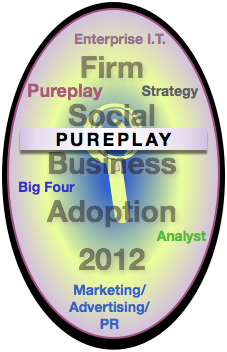 Pureplays address social business as transformation by definition because they have been launched to address emerging market needs that established players either do not yet understand or have yet to organize to address. Moreover, Pureplays are not adding social business to their existing services; they have been formed to practice social business. They are a small cohort in this research survey because they were constrained to social business and transformation as were advisory firms in other categories. Pureplays address social business as transformation by definition because they have been launched to address emerging market needs that established players either do not yet understand or have yet to organize to address. Moreover, Pureplays are not adding social business to their existing services; they have been formed to practice social business. They are a small cohort in this research survey because they were constrained to social business and transformation as were advisory firms in other categories.
Pureplay firms are often smallish startups, so they are quite limited in some areas when compared to established legacy firms as in this research survey. From a market and client perspective, Pureplays represent a vital part of the market and can offer unique capabilities; however, clients need to approach them with “eyes wide open” because the way they serve clients varies considerably.
There are thousands of social media advisory Pureplay firms that are focused on marketing and promotion. Pureplays’ capabilities are largely colored by their founders’ backgrounds. Dachis Group, SideraWorks and SocialxDesign directly address social business as transformation. StrawberryFrog is an outlier in that is was founded in 1999, but it approaches transformation from a very social perspective. Its overall focus is creating “social movements,” but it’s a global firm with a fairly broad set of services. It does show up in social business and transformation searches, hence its inclusion here.
Advisory and Services Firm Social Business Adoption 2012 is a research survey that evaluates and quantitatively ranks the maturity of agency and consultancy social business practices. The survey ranks Strategy firms, Big Four, Marketing/Advertising/PR agencies, Analysts, Enterprise I.T. firms and Pureplays on their social business practices, service offerings and leadership—specifically according to their relevance for leading client organizations’ transformations to more human entities that are grounded in listening and responding, not marketing. Continue reading Pureplay Report: Advisory & Services Firm Social Business Adoption
By Christopher Rollyson 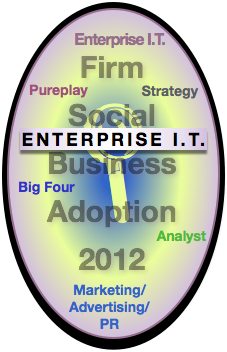 [UPDATED] Enterprise I.T. vendors are chiefly product businesses that specialize in large-scale “solutions,” and all contenders in this research survey field large services businesses. They are a diverse group that was selected based on their public activity relevant to social business transformation. For example, Salesforce.com is a leading cloud infrastructure and services provider that sells organizational flexibility, which synergizes with social. IBM, Dell and Hitachi are large product vendors, although IBM’s services business is now larger than its product divisions. Accenture, Infosys, Capgemini, TCS and Cognizant are large outsourcing providers, although Accenture’s roots are management consulting, and it subsequently developed a large outsourcing business. BearingPoint is regrouping after bankruptcy; its origin, like Accenture’s, was an audit firm spinoff (KPMG and Andersen respectively). [UPDATED] Enterprise I.T. vendors are chiefly product businesses that specialize in large-scale “solutions,” and all contenders in this research survey field large services businesses. They are a diverse group that was selected based on their public activity relevant to social business transformation. For example, Salesforce.com is a leading cloud infrastructure and services provider that sells organizational flexibility, which synergizes with social. IBM, Dell and Hitachi are large product vendors, although IBM’s services business is now larger than its product divisions. Accenture, Infosys, Capgemini, TCS and Cognizant are large outsourcing providers, although Accenture’s roots are management consulting, and it subsequently developed a large outsourcing business. BearingPoint is regrouping after bankruptcy; its origin, like Accenture’s, was an audit firm spinoff (KPMG and Andersen respectively).
As you evaluate advisory firms that are moving into social business, it is useful to refer to their DNA. Enterprise I.T. firms scale largely by selling products or productized services. Many have “collaboration” solutions, and they tend to approach social business within the context of product strategy. Product vendors are furiously bolting on “social” features to their enterprise software solutions. This characteristic engenders pluses and minuses: they are highly motivated to be relevant in social business because they have a direct line of sight to how it can make them money. On the minus side, they are mostly focused on moving product. Of course, Salesforce is a vendor that is disrupting the whole model (“No Software”).
Enterprise I.T. firms have significant promise for addressing the social business adoption life cycle. Like Big Four advisories, they have significant competency in enterprise transformation and process change—and they have the advantage of not being constrained by ties to regulated businesses. Consequently, their cultures are not as conservative. Capgemini is based in Europe while TCS, Infosys, Cognizant and Hitachi hail from Asia.
Due to its diversity, this group’s summary will fit for some better than others. Please refer to the Extended Analysis for individual analysis.
Advisory and Services Firm Social Business Adoption 2012 is a research survey that evaluates and quantitatively ranks the maturity of agency and consultancy social business practices. The survey ranks Strategy firms, Big Four, Marketing/Advertising/PR agencies, Analysts, Enterprise I.T. firms and Pureplays on their social business practices, service offerings and leadership—specifically according to their relevance for leading client organizations’ transformations to more human entities that are grounded in listening and responding, not marketing. Continue reading Enterprise I.T. Report: Advisory & Services Firm Social Business Adoption
By Christopher Rollyson 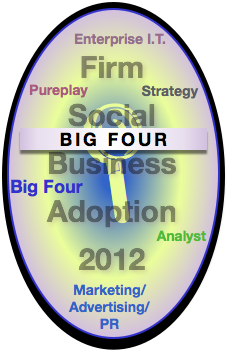 [UPDATED] The Big Four accountancies have been rebuilding their advisory practices for the past several years, and social business transformation fits with their core competencies in important ways. Like Strategy firms, they have been watching adoption and producing thought leadership on various aspects of social technologies’ relevance to business. Their approach also resembles that of strategy firms in that they have relatively low evidence of social business practice. [UPDATED] The Big Four accountancies have been rebuilding their advisory practices for the past several years, and social business transformation fits with their core competencies in important ways. Like Strategy firms, they have been watching adoption and producing thought leadership on various aspects of social technologies’ relevance to business. Their approach also resembles that of strategy firms in that they have relatively low evidence of social business practice.
Big Four firms are well positioned to evolve into social business consultancies because they have core competencies in business strategy and business process transformation. However, they will be challenged by their relative lack of core communications skills and awareness of “soft” social, people and behavioral knowledge.
Deloitte has been an early adopter of social business as a concept, perhaps because it did not shed its consulting practice in the early 2000s as all others did. PwC acquired boutique social business consultancy Ant’s Eye View in 2012, which shows its intention to integrate social business more deeply into its Customer Impact practice.
Publicly, KPMG and Ernst & Young are currently focused on limited offerings grounded in due diligence and social media governance. Ernst makes broad mentions of “strategy” and roadmaps.
Advisory and Services Firm Social Business Adoption 2012 is a research survey that evaluates and quantitatively ranks the maturity of agency and consultancy social business practices. The survey ranks Strategy firms, Big Four, Marketing/Advertising/PR agencies, Analysts, Enterprise I.T. firms and Pureplays on their social business practices, service offerings and leadership—specifically according to their relevance for leading client organizations’ transformations to more human entities that are grounded in listening and responding, not marketing. Continue reading Big Four Report: Advisory & Services Firm Social Business Adoption 2012
By Christopher Rollyson 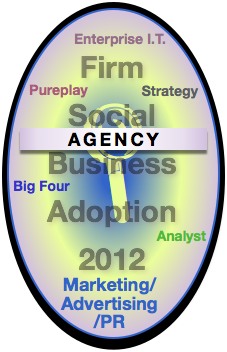 [UPDATED] Marketing, advertising and public relations (MAP) agencies have comprised the largest share of the “social” advisory and execution firms for many years. Most of the other advisory firms are relative late entrants, with the exception of some Analyst and Enterprise I.T. firms. Communication forms the core of social technologies, and MAP agencies have been pivotal in leading the growth of social media activity in their clients, many of the largest brands in the world. [UPDATED] Marketing, advertising and public relations (MAP) agencies have comprised the largest share of the “social” advisory and execution firms for many years. Most of the other advisory firms are relative late entrants, with the exception of some Analyst and Enterprise I.T. firms. Communication forms the core of social technologies, and MAP agencies have been pivotal in leading the growth of social media activity in their clients, many of the largest brands in the world.
However, this research survey argues that, although social media will remain an important portion of the total economic value produced by using social technologies, it will devolve into a minority portion. Collaboration and pervasive innovation will be the majority, which will require enterprise business process transformation. MAP agencies lack competencies in management consulting and enterprise transformation, so they are in an ambiguous situation, being the leaders in social media, a shrinking market in the medium to long term. This report shows how agencies can navigate these rapids and how their clients might best partner with them for social business transformation.
Advisory and Services Firm Social Business Adoption 2012 is a research survey that evaluates and quantitatively ranks the maturity of agency and consultancy social business practices. The survey ranks Strategy firms, Big Four, Marketing/Advertising/PR agencies, Analysts, Enterprise I.T. firms and Pureplays on their social business practices, service offerings and leadership—specifically according to their relevance for leading client organizations’ transformations to more human entities that are grounded in listening and responding, not marketing. Continue reading Agency Report: Advisory & Services Firm Social Business Adoption 2012
By Christopher Rollyson 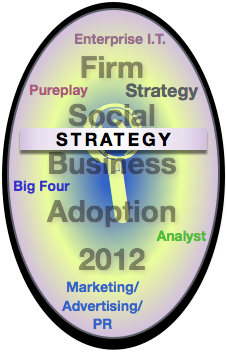 [UPDATED] Strategy firms are the most trusted names sought by CEOs and boards of directors who are reevaluating their companies’ identities, strategies and operations. Strategy firms have been making measured investments in social business over the last few years. Their knowledge of enterprise transformation is deep and broad, and they all have proprietary methodologies for most aspects of the strategy and transformation life cycle. They have deep and broad expertise in market analysis, competitive analysis corporate core competency analysis and virtually all aspects of operations. Many firms have large business transformation practices that explicitly guide clients through profound redefinition and change. [UPDATED] Strategy firms are the most trusted names sought by CEOs and boards of directors who are reevaluating their companies’ identities, strategies and operations. Strategy firms have been making measured investments in social business over the last few years. Their knowledge of enterprise transformation is deep and broad, and they all have proprietary methodologies for most aspects of the strategy and transformation life cycle. They have deep and broad expertise in market analysis, competitive analysis corporate core competency analysis and virtually all aspects of operations. Many firms have large business transformation practices that explicitly guide clients through profound redefinition and change.
Strategy firms have extensive core competencies that could enable them to offer social business strategy services. In addition, Strategy firms are significant producers of thought leadership relevant to corporate and business strategy as well as operations. Most firms field high quality management journals whose papers are written by their consultants. Many have research boutiques or even full-fledged businesses for research and thought leadership. However, they are challenged by very conservative cultures and have lagged adopting social technologies. Many firms are very private, which stems from the fact that much of their is conducted in utmost secrecy due to its strategic nature.
Advisory and Services Firm Social Business Adoption 2012 is a research survey that evaluates and quantitatively ranks the maturity of agency and consultancy social business practices. The survey ranks Strategy firms, Big Four, Marketing/Advertising/PR agencies, Analysts, Enterprise I.T. firms and Pureplays on their social business practices, service offerings and leadership—specifically according to their relevance for leading client organizations’ transformations to more human entities that are grounded in listening and responding, not marketing. Continue reading Strategy Report: Advisory & Services Firm Social Business Adoption 2012
|
|
![Herd the Cats [Social Business Team Building] Case4](http://rollyson.net/wp-content/uploads/2013/04/sbtb4.png) [UPDATED] Herd the Cats is usually initiated by the CMO/CDO (Chief Digital Officer) or other enterprise practice or brand executive who discovers that various business units or brands in the organization have diverse social media presences without much apparent direction or business results. S/He wants to use strategy to provide a keel that resonates with corporate strategy, addressing issues as diverse as corporate citizenship, community, health or policy.
[UPDATED] Herd the Cats is usually initiated by the CMO/CDO (Chief Digital Officer) or other enterprise practice or brand executive who discovers that various business units or brands in the organization have diverse social media presences without much apparent direction or business results. S/He wants to use strategy to provide a keel that resonates with corporate strategy, addressing issues as diverse as corporate citizenship, community, health or policy.

![Catch Social Media Leaders [Social Business Team Building] case3](http://rollyson.net/wp-content/uploads/2013/04/sbtb3.png)
![Fire Drill [Social Business Team Building] Case2](http://rollyson.net/wp-content/uploads/2013/04/sbtb2.png)





